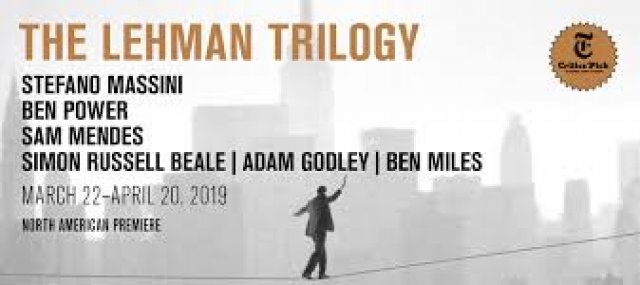The Lehman Trilogy by Stefano Massini
Sam Mendes Directs at Park Avenue Armory
By: Susan Hall - Mar 28, 2019
The Lehman Trilogy
By Stefano Massini
Adapted by Ben Power
Sam Mendes, Director
Es Devlin, Set Designer
Katrina Lindsay, Costume Designer
Luke Halls, Video Designer
Jon Clark, Lighting Designer
Nick Powell, Composer and Sound Designer
Candida Caldicot, Music Director
Polly Bennett, Movement
Starring Simon Russell Beale, Adam Godley, and Ben Miles
Produced by the National Theatre and Neal Street Productions, and Park Avenue Armory
New York, New York
March 29, 2019
In a co-production with National Theatre and Neal Street Productions, the Park Avenue Armory is presenting a multi-generational story of the Bavarian family Lehman in America. Captivated by Ben Powers' Biblical translation of Stefano Massini's The Lehman Trilogy, director Sam Mendes has worked with three brilliant actors to create a cast of hundreds. It is a testimony to the talents of Simon Russell Beale, Adam Godley and Ben Miles that we believe one man can be a young woman, a child, and an aging patriarch if not at once, certainly standing next to each other.
The rectangular box inserted into the Armory's huge space is the same as the London production's. The video background, ranging from a boat which sails for 45 days across the Atlantic, to cotton fields and then Wall Street, is a miracle of efficiency. Lehman moved to midtown Manhattan after 9/11. The actors are all wirelessly miked, which makes hearing even in the rafters easy and unstrained. The set is simply rich. The huge Drill Hall brings to life a story of Homeric dimensions.
A live electronic piano also resounds throughout the Drill Hall and mixes seamlessly with computer-driven music and sound effects.
This is both the story of an immigrant family in America and also of being Jewish in America. The original Lehmans were accepted without a blink in Montgomery, Alabama. Rituals like sitting shiva diminish in importance as time passes. Integrating does not, however, appear to be at the heart of the family firm's demise.
Instead, we are left to ponder the move from business based on goods, like cotton and oil, to the business simply of making money with money. Germany has entered the 21st century by making the manufacture of real goods the heart of its economy. Other countries may not be able to adopt the German model. The production of the very finest products in any field and then selling into markets that are willing to pay higher prices for the best. America certainly can't match Germany's engineering skills.
The Lehmans did very well indeed when they dealt with real goods like cotton. A patriarch's nightmare about being crushed by railroads was cast out when the family invested in them successfully. At the same time, Lehman Brothers was moving into making money with money, which would bring their downfall a hundred years later.
Wall Street is a place where “where every day, men walk on air”. On a tightrope strung between two lampposts in front of the Lehman Wall Street office, an earlier version of Philippe Petit walks balancing for years, until the crash of 1929.
Family businesses have their own aroma. A current Lehman descendant chairs the Boston Symphony Orchestra. The family business, Helzberg Diamonds, sold to Warren Buffet and funds the Kansas City Arts Center. Nicholas Taubman sold the family auto parts business and is now one of the three or four people of great capacity who fund Peter Gelb's Metropolitan Opera. The family's money can be used well.
Families like the Fords collectively own less than 2% of the automaker. They remain, however, firmly in control with 40% of the voting power through a special class of stock. Around thirty-five Fords are actively involved in the company. When one of them failed as president of the company, they gently suggested he step down. Lehman, however is gone.
Greed gets smoothed over with lovely language of the trilogy. Can it really be that making money with money, and inventing ever more abtruse derivatives is exciting? Mathematicians who scamper from MIT to Wall Street may get excited by algorithms, but are they good for the economy?
Mendes and his cast move us through over a hundred years with punchy dialogue set in the firm cradle of story telling. The actors move from tellers of tales to scene setting without a beat. It is as remarkable a feat as the company that flourished for a century and a half. It went down only when outsiders took over.
Tickets available at Park Avenue Armory

